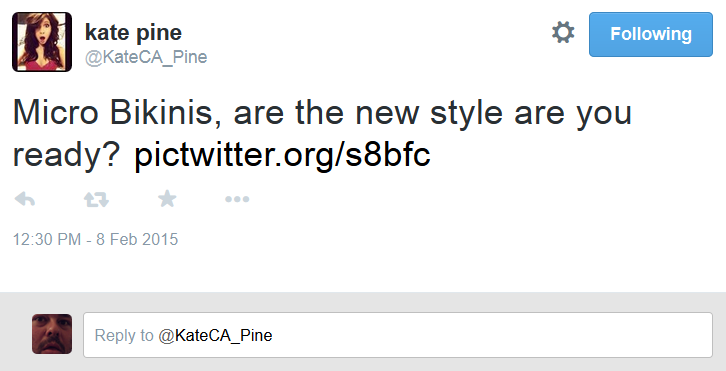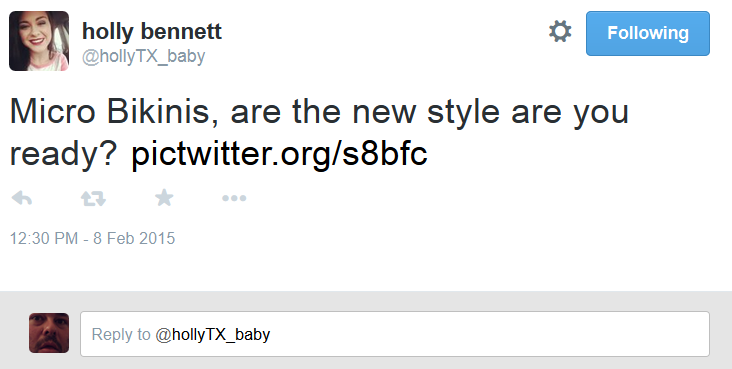OK, social media gurus. Riddle me this.
A few months back I unfollowed five accounts on Twitter because they were all posting the same content (almost always links to listicles). Each account belonged (ostensibly) to a different attractive young lady with a non-trivial amount of followers (tens of thousands). Each account followed me first, and I then followed them back. Before I unfollowed them, I asked all of them in two different tweets why they all posted the same content within seconds of each other. There was no answer, so I unfollowed them, and they all returned the favor within a day or so.
Now it’s happening again.
Note the timestamps.
Now originally I had actual embedded tweets above (instead of images), but I discovered something interesting. These listicle tweets don’t last any longer than a few minutes. When I previewed them while I was writing the post, they displayed correctly. When I published the post, the links were broken.
Now there is a difference with these two and the five I referred to earlier. These two tweet other things besides these links, and sometimes they’re funny. However, the more closely I read them, the more I think they could easily be pulling from a big database. There is never anything particularly topical, for example. And most of the “spontaneous” comments are vaguely naughty and/or cynical.
The bottom line is I think these Twitter accounts are automated. Some considerable effort has gone into making them appear otherwise. There are multiple photographs of the supposed account owners, for example (and oooh, creepy thought I just had: what if these photos are just lifted from somewhere and the actual person depicted has no idea?).
So, my question: what is the purpose of this deceit? Where is the lucrative angle for its perpetrator?
You might also like:
- “A comprehensive social media strategy”? Being that guy…for a bit
I get followers on Twitter from time to time whose bios are full of nebulous marketingese, but it’s … - On hiatus until July 8
Dudes and dolls, I started kicking around the idea of taking the long weekend off from BoWilliams.co… - Tornadoes? Floods? They’re just red states. What’s the big deal?
We’re just through our first tornado outbreak of the season. It was certainly nothing like 2011 in t… - Social media overload?
So I understand Google+ is live to everyone today. Also, lots of people are incensed that Facebook h… - North Alabama Human Trafficking Task Force now on Twitter
The North Alabama Human Trafficking Task Force now has a Twitter account. Come follow us! …



I get that it increases hits to the sites the posts link to, but why make the posts only last a few minutes?
I’ve two possible motives:
1. Malicious links. If they’ve got a few thousand people seeing the link, and maybe a 1% click rate, that’s still a decent return on investment (the investment, is a bot/script that posts the links in bulk). Click with caution, as just visiting the link can get you in trouble.
2. It’s for search engine optimization (SEO). It’s purely to get more clicks or links/refers so that their sites show up higher in search results. It’s been observed that the quality on search results has started to diminish, because people gaming the system have gotten good at it. But I suspect the algorithms will be adjusted and the cat and mouse game will once again reset.
Either way, these types of accounts get nothing but a block/ignore from me on any social media sites.
The lasting only a few minutes is probably because the links are getting reported or automatically detected. But if they get seen and clicked at all, they’ve done their job.
These accounts aren’t ever in trouble, though. They’ve accumulated tens of thousands of followers, most likely one at a time. (I have 70+ Twitter acquaintances who follow one; 40+ who follow the other). Clearly it takes more attention than most people are paying to determine that they’re likely illegitimate.
I wondered later if the links vanished after a few minutes to make them more difficult to detect, in the event that you happened to follow more than one of them.
Lulling you into believing they are harmless SEO drivers. Eventually the link will be to some cryptolocker part deux and your machine is hostage.
Or maybe some psych grad student is doing a very interesting study.